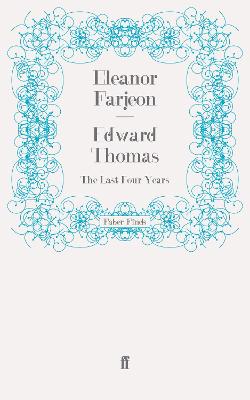Oxford Paperbacks
2 total works
Eleanor Farjeon first met Edward Thomas in the late autumn of 1912, when her brother invited him to tea. It was the beginning of a deep friendship between the painfully shy 31-year-old woman and the reserved writer known for his prose works and literary criticism. Though he died at the Battle of Arras in April 1917, it was a friendship which for Eleanor did not end with his death, but lived beyond it in his letters, and his poems, many of which Edward had sent to her from the trenches of the First World War for her comments.
This double memoir uses Edward's letters and Eleanor's diaries and linking commentary to provide an extraordinarily candid account of their developing friendship, and of the enthusiasms they shared - both loved walking, and it was during this period that Edward first found his way into poetry. Edward was often deeply depressed, a man who found in nature something fundamental and ideal, a soldier-poet who wrote about the war in a new way, but Eleanor also shows us another side to his character, capturing moments of joy and humour. She also offers a unique account of Thomas's development as a poet, including the momentous meeting in 1913 with the American poet Robert Frost, whose encouragement led to Thomas's first poems. Thomas describes for her his family, his friendships with other writers, D H Lawrence among them, and also provides an exceptionally detailed account of his experiences in the First World War with the Artists' Rifles.
Edward Thomas: The Last Four Years, was widely acclaimed on its first publication in 1958 - this second edition, published on the 80th anniversary of Thomas's death, has an introduction by Anne Harvey, a selection of Eleanor's sonnets 'To E.T.', and 'Walking Tom', a hitherto little-known poem about Edward written by Clifford Bax and Herbert Farjeon. Also included are eight pages of black and white photographs.
'Nellie' was born in 1881, her father a popular novelist, her mother from a famous American acting family. She was never sent to school, was often in poor health and developed a crushing self-consciousness in company. The nursery at home therefore marked the limits of her universe through her formative years; yet it was in this hothouse atmosphere that 'Nellie' began to read, write stories and, with her three brothers, evolve the rituals and games that dominated their lives. Though she later admitted that such experience hampered her mature development, her imagination certainly flourished, a gift that was soon to communicate itself to legions of readers.

